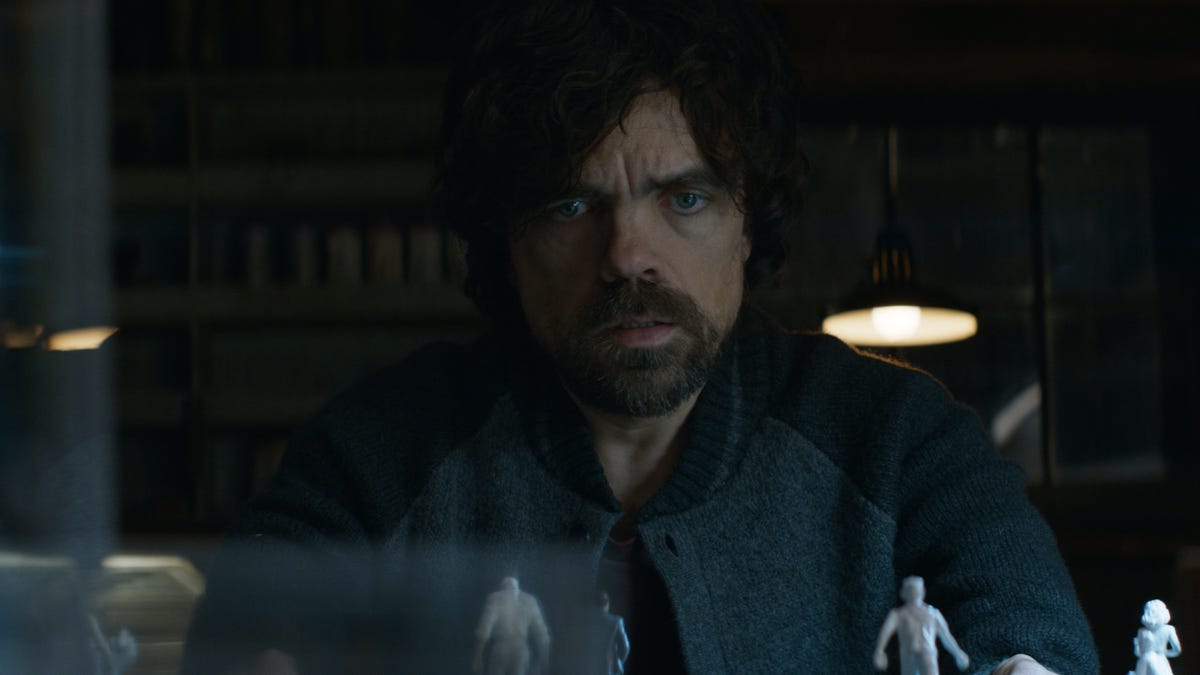Peter Dinklage takes you on tech's not-too-distant mind warp
In the Sundance premiere movie "Rememory," Peter Dinklage and Mark Palansky play out why our brains may not be ready for a next frontier.

Peter Dinklage stars in "Rememory," a movie that questions the merits of a groundbreaking, well-meaning technology.
"Rememory," a new movie about what our minds forget, tries to teach a tech lesson that its makers hope you'll remember.
The film, a sci-fi crime drama about a groundbreaking device that records unfiltered memories, spins a cautionary tale of how even well-intentioned technology can, well, ruin lives. Premiering Wednesday at the Sundance Film Festival, it stars Peter Dinklage, best known for playing sharp-witted Tyrion Lannister on "Game of Thrones," and it was written and directed by Mark Palansky, who also directed Dinklage in 2006's modern-day fairy tale "Penelope."
It's one of a number of films at this year's Sundance that delve into tech-related themes or make use of boundary-pushing technology. The 40-minute "Miyubi," for instance, requires viewers to don a
VR
headset to witness a family drama as seen through the eyes of a toy robot. The Kristen Stewart-directed short "Come Swim" gets its trippy images through the use of neural networks, key engines of artificial intelligence.
In "Rememory," Dinklage plays Sam Bloom, a man questioning his own recollections about the final moments of his brother's life. But the plot of the movie is driven by "the machine," a device that can record and replay people's pure memories, storing them on a glass slide like a futuristic mind-reading thumb drive anyone can plug in and watch.
After the device's inventor mysteriously dies, Dinklage's character steals the machine and uses it to piece together clues about its maker's death from a box of stored memories -- as well as to investigate forgotten details buried in his own brain. (In a poignant reminder of loss and remembrance, the film also stars Anton Yelchin, the "Star Trek" movie actor who died last June in an automobile accident.)
Dinklage and Palansky, in an interview in a glass-enclosed room overlooking the snowy Main Street of Park City, Utah, described their own misgivings about how humans cope with technology, both the tech that exists today and the kind that could become reality tomorrow.
Our human biology is always going to be at war with technology, as Dinklage put it, especially as progress outpaces our ability to adapt to it.
"Darwinism hasn't caught up with Steve Jobs ," he said.
Even during the making of "Rememory," Palansky caught wind of studies that mapped brain activity and matched it with videos to make movies of subjects' memories and dreams. Will "Rememory" be among a class of films that imagines a technology before it becomes a reality? Maybe.
"I don't think it's fantasy," Palansky said. "The machine absolutely can and will exist."
And like the technology it imagines, "Rememory" is neither completely good nor bad.
Director Mark Palansky wrote "Rememory" as a vehicle for Peter Dinklage, who played a role in Palansky's 2006 film "Penelope."
Occasionally the film leans on unrealistic devices, like a character proclaiming her thoughts aloud to herself, to tie a ribbon around a plot point that may have been better left unsaid.
And when Dinklage's character continues to administer the machine on himself, even after he learns it could damage his brain, it's like watching a horror-movie heroine slowly open a door you know hides an ax murderer. It takes everything in you to resist yelling "Stop!" at the screen.
But the movie was written with Dinklage in mind, and his fans will enjoy seeing him shine. The actor is skilled at recruiting an audience's loyalty, making him a convincing avatar for ourselves as he unravels the plot's mysteries.
He's supported by other strong performances, like that by Julia Ormond as the widow of the inventor. Their scenes together are among the strongest of the film. A plot twist at the end makes you wish the movie would afford itself the space to explore their relationship more.
And as a cerebral thriller, it should give enthusiasts of the genre enjoyment in its mix of crime procedural with dark, realistic sci-fi.
Despite the film's bleak take on technological progress, both Dinklage and Palansky tipped their hats to the creative doors that technology opens. For "Rememory," the pair crowdsourced memories online to include in the movie, via the site therememoryproject.com. They encouraged anyone to film one of their memories and upload it, keeping their instructions intentionally vague. They received about 1,000 clips from around the world; about a half-dozen of them are included in the final film.
And Dinklage, despite his qualms about how quickly technology has changed our lives and relationships, finds solace in the idea that our brains must stick with a slower, evolutionary pace.
"At the end of the day," he said, "for me, that's kind of comforting."
Technically Literate: Original works of short fiction with unique perspectives on tech, exclusively on CNET.
Batteries Not Included: The CNET team shares experiences that remind us why tech stuff is cool.

